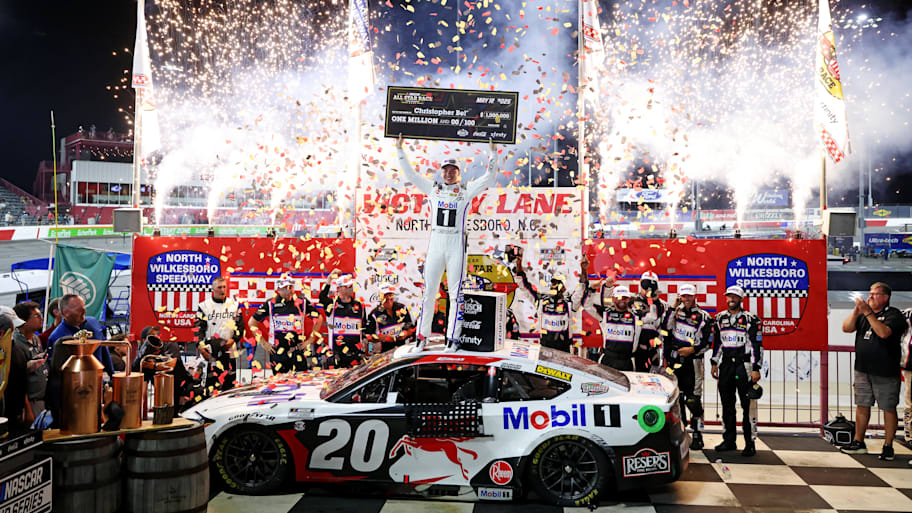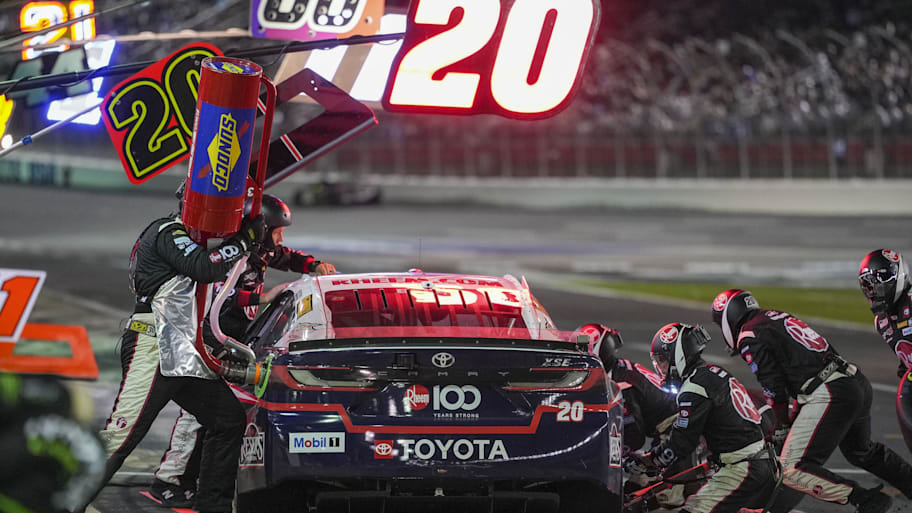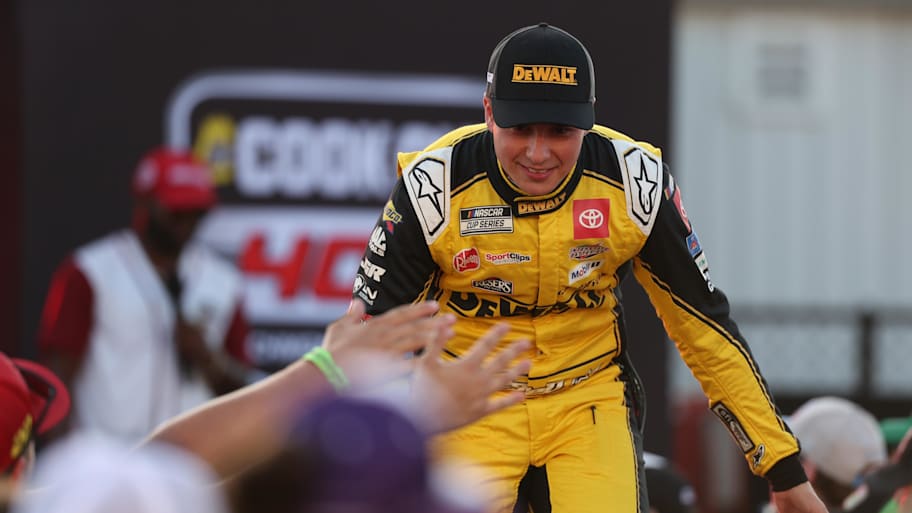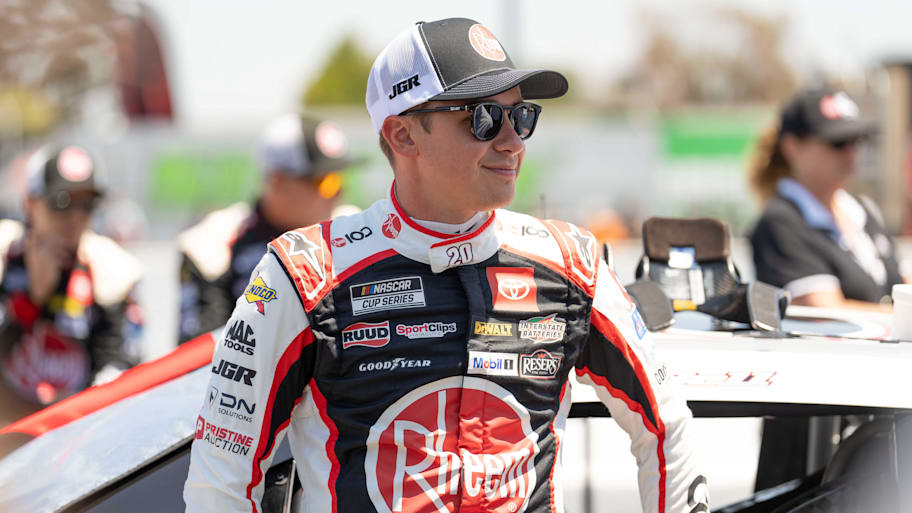After his second-place run at Watkins Glen on Aug. 10, driver Christopher Bell stands sixth in the NASCAR Cup standings. The runner-up showing was his third top 10 finish in his last six races. Bell started the year hot, winning three in a row after finishing 31st in the season-opening Daytona 500. But he hasn’t been able to find his way back to Victory Lane. His recent surge is a promising sign with the Cup playoffs set to begin on Aug. 31 at Darlington.
Going fast and winning races hasn’t usually been a problem for the 30-year-old Bell, who has been pushing cars to the limit—first on dirt and later on asphalt—since he was five years old. He grew up in Norman, Okla., competing in micro-sprint and midget cars on the state’s dirt-racing circuit. His talent got him picked up by Toyota Racing Development, and he eventually found his way to the NASCAR truck series in 2015. Five years later he made the jump to the Cup series. He joined Joe Gibbs Racing, his current team, in 2021.
Sports Illustrated chatted with Bell recently about his career in motor sports, his family and the significant differences between dirt and asphalt racing.

SI: What was your Welcome to Racing moment?
Christopher Bell: [Laughs.] How early do you want me to go back? Because I certainly remember my Welcome to Racing moment. Man, I remember it so clearly. When I was five years old my parents and my dad’s friend—I call him my Uncle Will—they took me to a dirt track in Oklahoma. And I remember getting to the racetrack and being super nervous. Like we had this planned out: They rented a car for the day; we ran all around town making sure that I had a fire suit, a helmet, shoes. But when it came to the time to race, I was super nervous. My mom actually had to bribe me to get in the car. Oh, my gosh. And then once I got in the car, man, it was it just game over. I was hooked. And that was my Welcome to Racing moment. Like that first time that I drove the car I said, Why would I want to do anything else? And I was a five-year-old kid at the time. It was just like the most surreal feeling and a moment that I’ll never forget for the rest of my life.
SI: What did your mom bribe you with?
Bell: She bribed me with a video game. I was a big into—I don’t know what it was—Nintendo 64 or whatever it was back in the day. She said, “You have to drive this car.” And I did. I drove drove the car, and I fell in love with it.
SI: So you were driving for more than a decade before you got your driver’s license.
Bell: Yeah, I mean, I didn’t know any different. I’m sure my parents were nervous about it. But I’m going to say that they got tricked into thinking that it was safer than it was. They were kind of under the belief that it was safe. I had a fire suit on. I had a helmet on. I was strapped in. I had a roll cage around me. So, they thought it was safe. And I loved it with all my heart, so they were they were all for it. And it became normal. I remember whenever I took my driver’s test, whenever I was 16, it just was normal driving the car. That’s just what I grew up doing.
SI: You’re not from a racing family—your dad was a high school basketball coach. How did you first get into racing?
Bell: He was, yeah. My family was not into motor sports. It was my dad’s friend: I call him Uncle Will. His name is Will Orr. He raced and he’d been around racing his whole life. His kid raced at the dirt track there in Oklahoma City, and Uncle Will took me to a race and I became attached to it, and my love for it grew. And Uncle Will said, “Hey, look, you want to try and let him drive and see what happens?” And that’s what led us out there and the rest of it is history.
I mean, racing is definitely a hard sport to get into. You don’t just go to an academy and buy a race car and buy a fire suit. So, it is tricky in that respect. Thankfully, my Uncle Will was kind of there to steer the ship and let us know the direction to go.
SI: Did racing become more a part of your parents’ lives than they ever expected?
Bell: 100%, That’s a great way to put it. We started it out as just this hobby and this thing that their son enjoyed doing. And so, on the weekends, they would take me out to the dirt track and go race. And then it turned into something that we all enjoyed doing and spending a ton of quality time on, just traveling up and down the highway. I remember when I got into my teenage years my dad actually took a new job and was away from home a little bit, so my mom would take me racing—and she could not drive a truck trailer at all. So, I was 15 years old with my learner's permit, and I was the one driving the truck and trailer to the track. It definitely became a family bonding thing, and it was an enjoyable time throughout my childhood, for sure. For all of us—for me and my parents.
SI: What was school like for you?
Bell: Yeah, school was tough. I mean, when I was young and in elementary and middle school, racing was just a hobby, obviously, and it was on a Friday night, Saturday night type deal, and it didn't really interfere with school. But when I got into high school and the talk was about, “What do you want to do in college? What are you going to do with your life?” It became apparent that I didn’t really have desire to do that.
I was into sports growing up. My dad was a basketball coach. Growing up in Norman, Okla., football is a huge deal, so I love football, I love basketball. And through elementary school I played those sports. And then whenever it became time where practice became more involved and it became more serious, I didn’t like it because it started taking away from my time being around race cars or going to the racetracks. So, I would say at the end of middle school and early high school years I started shifting my focus more toward racing. And I’m honestly shocked that my parents would let me do that, but they were on board with it. I guess they saw that I was having success as a kid, doing it as a hobby, and they just kind of let me get a little bit more leash, a little bit more leash.
And I ended up dropping out of high school in my sophomore year, and I just kind of dedicated my life to racing. And I said, “You know what? I’m gonna make racing my job.” And I never thought in a million years I’d be a NASCAR driver. I thought that I’d just be a professional dirt racer and I would make it happen. So, I was pretty committed at a young age, and it started with those high school talks about, “Where are you going to go to college?” And I was like, “I’m gonna race. I’m not going to go to college.”

SI: What was your first big break in racing?
Bell: So, it was 2010. Up until 2010, I had been driving just my parents’ family-owned cars. We were very blessed to have the financial means to get started. But it was our competitiveness as I was continuing to grow and climb the ladder in the in the sport. We just didn't have the financial means to keep up with the nice equipment—the best engines, the best cars.
So, it was a man by the name of Darren Ruston. He was the one who gave me my first big break, and he has ties with NASCAR. His daughter was [former driver] Kenzie Russon. She’s actually married to [truck series driver] Daniel Hemric now. So, Kenzie Hemric, Daniel Hemric, Darren Ruston— those people will always have a special place in my heart. Darren Ruston gave me my first opportunity in great equipment, and his cars were superfast, he had great engines, and it allowed me to really showcase my talent. And I was able to perform well and win a lot for him, and then that kind of put me on the map a little bit, and it gave me the opportunity to stand out from the competition.
SI: And it was four or five years later that you went to the truck series?
Bell: Yeah. I got my first NASCAR start in 2015. So, there were quite a few steps in between driving for Darren Ruston till I got my first NASCAR start. But I basically, you know, was able to just continue to work the ranks of dirt-track racing and continued to stand out and elevate myself and got fortunate enough to be picked up by Toyota Racing Development.
SI: Was the transition to asphalt racing tough?
Bell: As soon as I got into asphalt racing I was pretty fast right away, and driving the car fast and being faster than my competitors was pretty easy for me. And I think that that came from my dirt background. I think dirt is—it’s hard to drive, right? Because the car’s sliding around and you’re constantly battling the car on the track. So, I think that allowed me to have speed on asphalt because asphalt has a lot more grip.
The thing that was extremely hard for me when I got to the asphalt side was just the style of racing. Growing up, dirt track racing—like I did sprint car races, which are very short. They’re sprints, so you drive hard and you don't really have to have patience or finesse. You’re just kind of all out all the time. And then when I got into the asphalt racing, the stock car stuff, it took me a while. And I still think to this day this is kind of my Achilles’ heel. These are not sprint races that we’re doing. They’re very long-distance races, and you can’t be all out all the time, otherwise you make mistakes and end up crashing out. So, just learning the discipline of racing on asphalt was hard, but going fast was easy.
SI: It seems like most people don’t think about Cup racing as an endurance sport, but in a lot of ways, it is.
Bell: Yeah, it really is. And it’s funny because I’ll never forget that truck races are short compared to Cup races. But that first time that I went truck racing I was like, Man, these races are so long! A truck race is 100 to 150 laps, most of the time. And I was like, This is just such a long race. And then then you move on to the Xfinity series, and those races are typically 200 to 300 laps, and it just it becomes more normal. And now here I am in the Cup series, where you do 500-mile races, and now truck races seem short. But I do remember that day that I went truck racing, and I was like, Man, these races are so long. How do you how do you do this?
SI: What advice do you have for young, aspiring drivers?
Bell: I love this question. I’ve been asked several times, and, you know, there is the narrative out there that you have to have money, you have to have financial backing in order to make it to the top. And I always say that it can be done without it— you just have to stand out from the rest. It’s very difficult to do that, but winners won’t be ignored, and winners won’t be denied. And if you continue to win at whatever discipline you’re in, and you stand out from the rest, there’s a likelihood of you getting an opportunity to move up. If you do move up, you’ve got to continue to stand out from the competition, and, you know, be a winner. So, my advice to kids growing up is if you want to make this your job, and you want to be at the top level, then you have to work at it and you have to win and keep after it.

SI: Do you have any hobbies outside of racing cars?
Bell: So, I didn’t. I didn’t for a while. And now I’ve gotten a little bit older, and yeah, I have. I live on Lake Norman [near Charlotte] now and I love going out and wake surfing on my boat. I would say the lake is what takes up most of my time outside of racing. I love watching sports, love watching basketball, football. So, yeah, I got a couple of hobbies. I was into golf for a little bit, but I that tapered off.
SI: Do you have a favorite track at any level?
Bell: Yeah, I’ve always loved Eldora [Speedway]. Eldora is one of my favorites on the dirt side. And then on the pavement side, I’d say Bristol. I would say Eldora and Bristol are my two favorites.
SI: What makes dirt racing so great?
Bell: So, in my opinion, what makes dirt racing so great is that the driver matters, especially compared to asphalt racing. You have to drive the car, and you’re not gonna be fast if you don’t have the talent to drive the car. The car matters so much in asphalt racing that you can have a lesser driver in a really fast car and it makes him look good. But you go to dirt racing and it doesn’t matter how good your car is. If you’re not going to drive it, then you’re not going to perform well.
SI: Does any other kind of racing appeal to you?
Bell: I would say F1 definitely appeals to me. I love the worldwide schedule and just think it’s a neat thing. But I never aspired to be a NASCAR Cup Series driver, so, you know, I’m content, I'm happy. I love where I’m at. I loved where I was at, you know, 20 years ago when I was running dirt cars. So, I’m content. I’m happy. And whatever comes my way I’ll be, you know, happy to give it a whirl.
This article was originally published on www.si.com as NASCAR’s Christopher Bell Has Been Racing Cars Since Age Five. Now It’s All Paying Off in the Cup Series.
